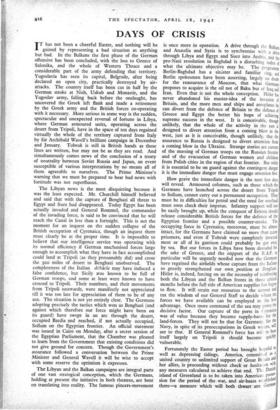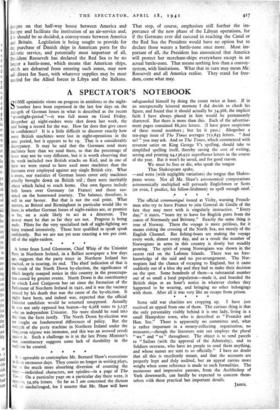DAYS OF CRISIS
IT has not been a cheerful Easter, and nothing will be gained by representing a bad situation as anything but bad. In the Balkans the first phase of the German offensive has been concluded, with the loss to Greece of Salonika, and the whole of Western Thrace and a considerable part of the army defending that territory. Yugoslavia has seen its capital, Belgrade, after being declared an open city, practically destroyed by air- attacks. The country itself has been cut in half by the German stroke at Nish, Uskub and Monastir, and the Yugoslav army, falling back before the onslaught, has uncovered the Greek left flank and made a retirement by the Greek army and the British forces co-operating with it necessary. More serious in some way is the sudden, spectacular and unexpected reversal of fortune in Libya, where German armoured units, operating across the desert from Tripoli, have in the space of ten days regained virtually the whole of the territory captured from Italy by Sir Archibald Wavell's brilliant campaign in December and January. Tobruk is still in British hands as these lines are written, but may not be as they are read. And simultaneously comes news of the conclusion of a treaty of neutrality between Soviet Russia and Japan, an event susceptible of various interpretations by no means all of them agreeable to ourselves. The Prime Minister's warning that we must be prepared to bear bad news with fortitude was not superfluous.
The Libyan news is the most disquieting because it was the least expected. Mr. Churchill himself believed and said that with the capture of Benghazi all threat to Egypt and Suez had disappeared. Today Egypt has been actually invaded and General Rommel, the commander of the invading force, is said to be convinced that he will reach the Canal in less than a fortnight. This is not the moment for an inquest on the sudden collapse of the British occupation of Cyrenaica, though an inquest there must clearly be at the proper time. It is impossible to believe that our intelligence service was operating with its normal efficiency if German mechanised forces large enough to accomplish what they have in fact accomplished could land at Tripoli (as they presumably did) and cross ' the 300 miles of desert to Benghazi unobserved. The completeness of the Italian debacle may have induced a false confidence, but Sicily was known to be full of German troops, and some at least were known to have crossed to Tripoli. Their numbers, and their movements from Tripoli eastwards, were manifestly not appreciated till it was too late for appreciation of them to be of any use. The situation is not yet entirely clear. The Germans adopting precisely the tactics which won us Benghazi (and against which therefore our force might have been on its guard) have swept in an arc through the desert, occupied Bardia and reached, if not actually occupied, Sollum on the Egyptian frontier. An official statement was issued in Cairo on Monday, after a secret session of the Egyptian Parliament, that the Chamber was pleased to learn from the Government that existing conditions did not give ground for concern. Though the Government's assurance followed a conversation between the Prime Minister and General Wavell it will be wise to accept with some reserve the optimism it expresses.
The Libyan and the Balkan campaigns are integral parts of one vast strategical conception, which the Germans, holding at present the initiative in both theatres, are bent on translating into reality. The famous pincers-movement is once more in operation. A drive through the Balkans and Anatolia and Syria is to synchronise with a drive through Libya and Egypt and Suez into Arabia, and the pro-Nazi revolution in Baghdad is a disturbing index of what the ultimate objective may be. The programme Berlin-Baghdad has a sinister and familiar ring, and Berlin spokesmen have been asserting, largely no doubt for the reassurance of Moscow, that what Germany proposes to acquire is the oil not of Baku but of Iraq and Iran. Even that is not the whole conception. Hitler has never abandoned his master-idea of the invasion of Britain, and the more men and ships and aeroplanes he can divert from the defence of Britain to the defence of Greece and Egypt the better his hope of achieving supreme success in the west. It is conceivable, though unlikely, that the whole of the activity in the east is designed to divert attention from a coming blow in the west, just as it is conceivable, though unlikely, that the assurance to Russia is designed to divert attention from a coming blow in the Ukraine. Strange stories are current of the massing of German troops on the Russian frontier and of the evacuation of German women and children from Polish cities in the region of that frontier. But while it is essential to be on guard against the contingent danger it is the immediate danger that must engage attention first.
How grave the immediate danger is the next few days will reveal. Armoured columns, such as those which the Germans have launched across the desert from Tripoli to Sollum, cannot carry out a permanent occupation. They must be in difficulties for petrol and the need for overhaul must soon check their impetus. Infantry support will not be easily brought up, while the conquest of Eritrea should release considerable British forces for the defence of the Egyptian frontier and a possible counter-stroke. The occupying force in Cyrenaica, moreover, must be almost intact, for the Germans have claimed no more than 2,000 prisoners, and even if Tobruk were completely invested most or all of its garrison could probably be got away by sea. But our forces in Libya have been denuded for the sake of Greece, and the support of the R.A.F. in particular will be urgently needed now that the Germans have regained the airfields whose capture from the Italians so greatly strengthened our own ,position at Benghazi. Hitleris, indeed, forcing on us the necessity of reinforcing both the Libyan and the Balkan fronts in those critical months before the full tide of American supplies has begun to flow. It will strain our resources to the utmost and tax the wisdom of our General Staff to decide where the forces we have available can be employed to the best advantage. Once more command of the sea may prove the decisive factor. Our capture of the ports in C.Yrenai'l was of value because they became supply-base,, for the land-forces. They will not be that for. German. for the Navy, in spite of its preoccupations in Greek wa.ers, see to that. If General Rommel's force has stil: to base itself largely on Tripoli it should become quicklY -vulnerable.
Fortunately the Easter period has brought hopeful as well as depressing tidings. America, committed as a united country to unlimited support of Great Br.:ain her allies, is proceeding without check' or hesitation any measures calculated to achieve that end. Th_ Danish island of Greenland is to be taken into America:: posses' sion for the period of the war, and air-bases es-Jblisbed there—,-a measure which will both thwart any Get1 des.gns on that half-way house between America and Eul ope and facilitate the institution of an air-service and, if it should be so decided, a convoy-route between America and Britain. Legislation is being sought to provide for the purchase of Danish ships in American ports for the Atl.,ntic service, and potentially most important of all, Pre,ident Roosevelt has declared the Red Sea to be no longer a battle-zone, which means that American ships, whi,:h are debarred from entering such zones, may now sail direct for Suez, with whatever supplies may be most needed for the Allied forces in Libya and the Balkans. That step, of course, emphasises still further the im- portance of the new phase of the Libyan operations, for if the Germans ever did succeed in reaching the Canal or the Red Sea the President would have no option but to declare those waters a battle-zone once more. Most im- portant of all, the President has announced that America will protect her merchant-ships everywhere except in an actual battle-zone. That means nothing less than a convoy- system, with limitations. What that in turn may mean Mr. Roosevelt and all America realise. They stand for free- dom, come what may.



























 Previous page
Previous page